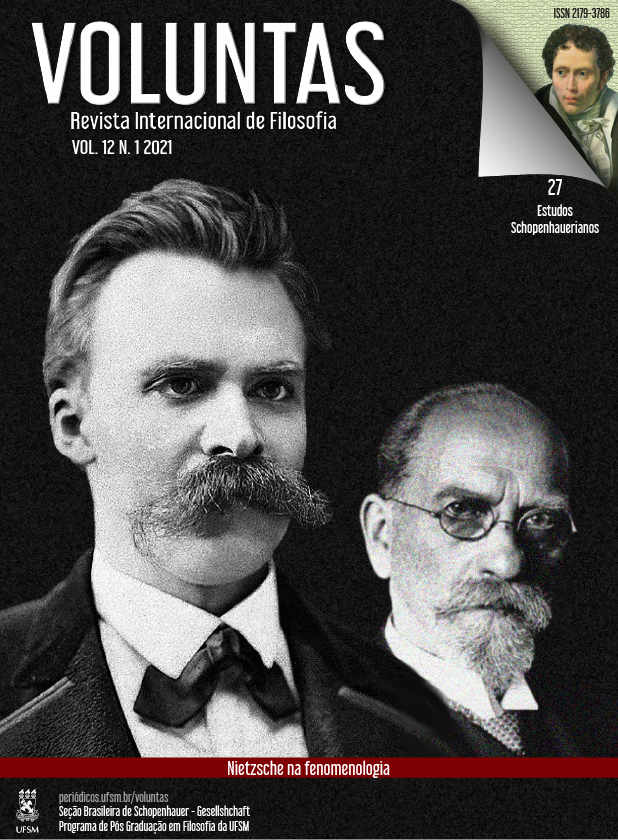Heidegger's interpretation of Nietzsche's eternal return and the question of time
DOI:
https://doi.org/10.5902/2179378664488Keywords:
Nietzsche, Heidegger, Eternal return, time.Abstract
The objective of the paper is to analyze Heidegger's interpretation of Nietzsche's eternal return, placing the issue of time as a central problem. For Heidegger, the philosopher of Zarathustra continues to be metaphysical, but it also constitutes the finishing of metaphysics. The eternal return has fundamental importance in this end of metaphysics, since thinking the instant as eternal, metaphysics is suppressed from within. In the lectures by Nietzsche I, the interpretation of the eternal return is intertwined with this end of metaphysics and inversion of Platonism, thereby revealing a conception of time contrary to metaphysics. On the other hand, in the 1950s, in Who is Nietzsche's Zarathustra? and the lecture What does it mean to think ?, Heidegger expands further into the interpretation of the eternal return and time, seeing in nietzschean philosophy not only the finish of metaphysics, but also the possibility of the passage to the poetic.
Downloads
References
HEIDEGGER, M. Nietzsche I. Trad.: Marco A. Casanova, Rio de Janeiro, Forense Universitária, 2010.
HEIDEGGER, M. Nietzsche II. Trad.: Marco A. Casanova, Rio de Janeiro, Forense Universitária, 2007.
HEIDEGGER, M. O que é metafísica? In: Heidegger. Trad. Ernildo Stein, São Paulo, Abril, 2005. (Coleção Os Pensadores)
HEIDEGGER, M. Qué significa pensar?. Tradução: Raúl Gabás. Madrid, Editorial Trotta, 2010.
HEIDEGGER, M. Quem é o Zaratustra de Nietzsche?. in: Ensaios e conferências. Tradução: Gilvan Fogel, Petrópolis, Editora Vozes, 2010, 91.
HEIDEGGER, M. Ser e tempo. Trad.: Fausto Castilho. Campinas-SP. Editora da Unicamp; Petrópolis-RJ. Editora Vozes, 2012.
MECA, D. S. Nietzsche ou a eternidade do tempo. Cadernos Nietzsche, São Paulo, n. 33, 2013, 181–196.
MÜLLER-LAUTER, W. Nietzsche-Interpretationen III: Heidegger und Nietzsche. Berlin; New York, De Gruyter, 2000.
NIETZSCHE, F. Assim falou Zaratustra. Tradução: Paulo César de Souza. São Paulo: Companhia das Letras, 2011.
NIETZSCHE, F. Crepúsculo dos ídolos. Tradução: Paulo César de Souza. São Paulo: Companhia das Letras, 2006.
NIETZSCHE, F. Sämtlich Werke. Kritische Studienausgabe (KSA). Organizada por Giorgio Colli e Mazzimo Montinari. Berlim: Walter de Gruyter & Co., 1999, 15 v.
NIETZSCHE, F. Gaia ciência. In: Obras incompletas (coleção os pensadores). São Paulo, editora nova cultura, 2005.
NUNES, B. A passagem para o poético (filosofia e poesia em Heidegger). São Paulo. Editora Ática, 1992.
Published
Versions
- 2022-03-29 (2)
- 2021-04-30 (1)
How to Cite
Issue
Section
License
Copyright (c) 2021 Voluntas: International Journal of Philosophy

This work is licensed under a Creative Commons Attribution-NonCommercial-ShareAlike 4.0 International License.
The submission of original manuscripts to this journal implies the transference, by the authors, of the copyrights for printed and digital publication. The copyrights of a published manuscript belong ultimately to the author, and only the copyright for its first publication is reserved to the journal. Authors may only use the same results in other publications explicitly indicating this journal as the medium of the original publication.
Licence
Attribution-NonCommercial-ShareAlike 4.0 International (CC BY-NC-SA 4.0) - This license lets others remix, tweak, and build upon your work non-commercially, as long as they credit you and license their new creations under the identical terms.






